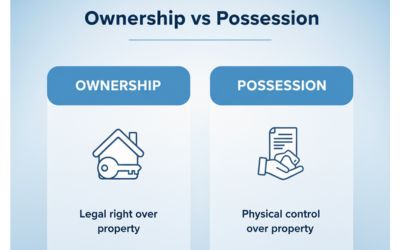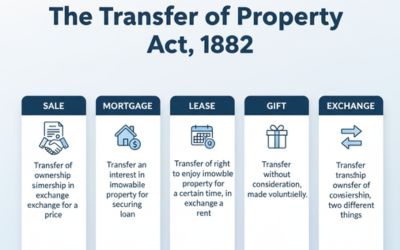Madhukar Nivrutti Jagtap v. Smt. Pramilabai (2020) 15 SCC 731
- Gulzar Hashmi
- India

Quick Summary
This case explains the doctrine of lis pendens (TPA, Section 52). The question: if a party sells the property while a suit is still going on, is that sale illegal? The Supreme Court said: the sale is not void. But the buyer takes it subject to the final court decision. So, the decree in the suit will bind the buyer.
Issues
- Are transfers made during the pendency of a suit illegal or void under Section 52 TPA?
- What is the legal effect of such transfers on rights decided by the decree?
Rules
- Lis pendens does not cancel the sale. It makes the sale subservient to the decree.
- The transferee is bound by the result of the pending suit and cannot defeat the decree-holder’s rights.
Facts (Timeline)
Timeline
Arguments
Appellant (Subsequent Transferees)
- Purchases should stand unaffected; they paid value and took title.
- Decree should not disturb their rights fully.
Respondents (Original Plaintiffs)
- Transfers pendente lite fall under Section 52 TPA.
- Any decree for specific performance binds the transferees.
- Transferees take property subject to suit’s outcome.
Judgment

Held: Referring to Section 52 TPA, the Court clarified that a transfer during a pending suit is hit by lis pendens in this sense—the decree will bind the transferee. The transfer is not void; it survives, but remains subject to the result of the suit.
- Purpose of Section 52 is to protect the suit’s subject matter from being defeated.
- Subsequent purchasers cannot claim better rights than the transferor had during the suit.
Ratio
Section 52 TPA does not annul transfers. It subordinates them to the decree. A pendente lite transferee is bound by the result and cannot defeat specific performance.
Why It Matters
- Stability of litigation: prevents parties from undermining suits by mid-suit sales.
- Guides buyers: pendente lite purchases are risky and conditional.
- Supports decrees: ensures effective specific performance.
Key Takeaways
- Transfers during suit are valid but subordinate to the decree.
- Transferee is bound by the final outcome of the litigation.
- Lis pendens protects the subject property from frustration.
- Specific performance can bind pendente lite purchasers.
Mnemonic + 3-Step Hook
Mnemonic: “SALE STAYS, DECREE SWAYS”
- The sale stays on record.
- The decree sways the final rights.
3-Step Hook:
- Ask: Was a suit already pending?
- Check: Did a transfer happen after filing?
- Conclude: Buyer is bound by the eventual decree.
IRAC Outline
Issue
Is a transfer pendente lite illegal/void, or only subject to the decree under Section 52 TPA?
Rule
Lis pendens does not annul transfers; it binds transferees to the decree’s outcome.
Application
Subsequent purchasers may be added as parties; they hold title subject to specific performance decreed by the court.
Conclusion
Transfers are valid but subordinate; decree binds the transferee.
Glossary
- Lis Pendens
- A doctrine that restrains parties from changing property rights during a pending suit.
- Pendente Lite
- “During the suit”; describes actions taken while litigation is underway.
- Specific Performance
- Court order to perform a contract, usually for sale of immovable property.
FAQs
Related Cases
Lis Pendens Line
Cases explaining how Section 52 TPA binds subsequent purchasers to the decree.
Specific Performance
Decisions on enforcing agreements to sell immovable property against later transferees.
Case Metadata
Share
Related Post
Tags
Archive
Popular & Recent Post













































































































Comment
Nothing for now